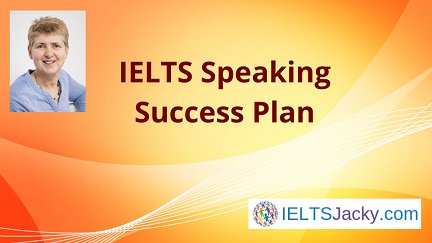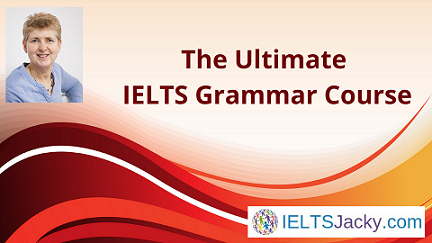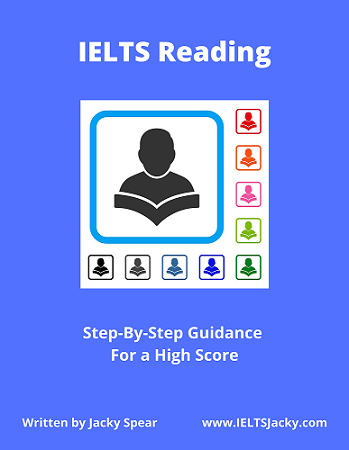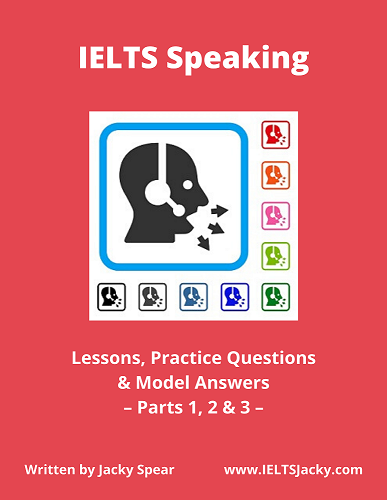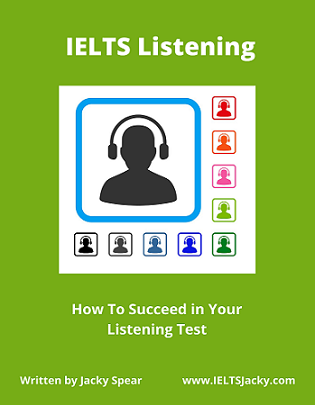IELTS
Writing Exam
– Task 2 Marking Criteria –
To get a high score in the
IELTS writing exam, you need to know exactly what the examiner wants. So, the
first step to achieving success is to understand the marking criteria.
Once you understand this, you can focus on developing the rights skills and techniques needed to meet the criteria. The website is packed full of lessons and tips to help you with this.
On this page you will:
- Gain an understanding of the 4 marking criteria.
- Find out what you need to do to get a high score.
- See examples of good and poor answers.
- Learn some common mistakes to avoid.
We’ll start with an overview of the 4 marking criteria. Here are the 4 skill areas you’ll be assessed on.
The 4 Marking Criteria:
- Task Achievement
- Coherence and Cohesion
- Vocabulary (Lexical Resource)
- Grammar
Want to watch and listen to this lesson?
Click on this video.
Each carries 25% of the marks.
We’ll now look at each of these criteria in turn. Don’t worry if the detail seems complex and overwhelming. I’m going to break it down and make it easier for you to understand. I’ll also show you exactly what you need to do get a good score.
We’re going to focus on Bands 6 - 8 as these are the levels most students are aiming for. You can see a table of all the band level marking criteria for IELTS writing exam Task 2 by clicking this link – Task 2 Marking Criteria.
Task Achievement
Task achievement is your ability to answer the question properly.
To score well for task achievement, you must do 3 things:
- Answer the actual question asked (i.e. don’t just write generally about the topic).
- Answer all parts of the question.
- Clearly express your opinion and
support it with well-developed ideas and, ideally, examples.
Here are the marking criteria for Task Achievement, of which the above bullet points are a summary.
IELTS Writing Exam Task Achievement Marking Criteria
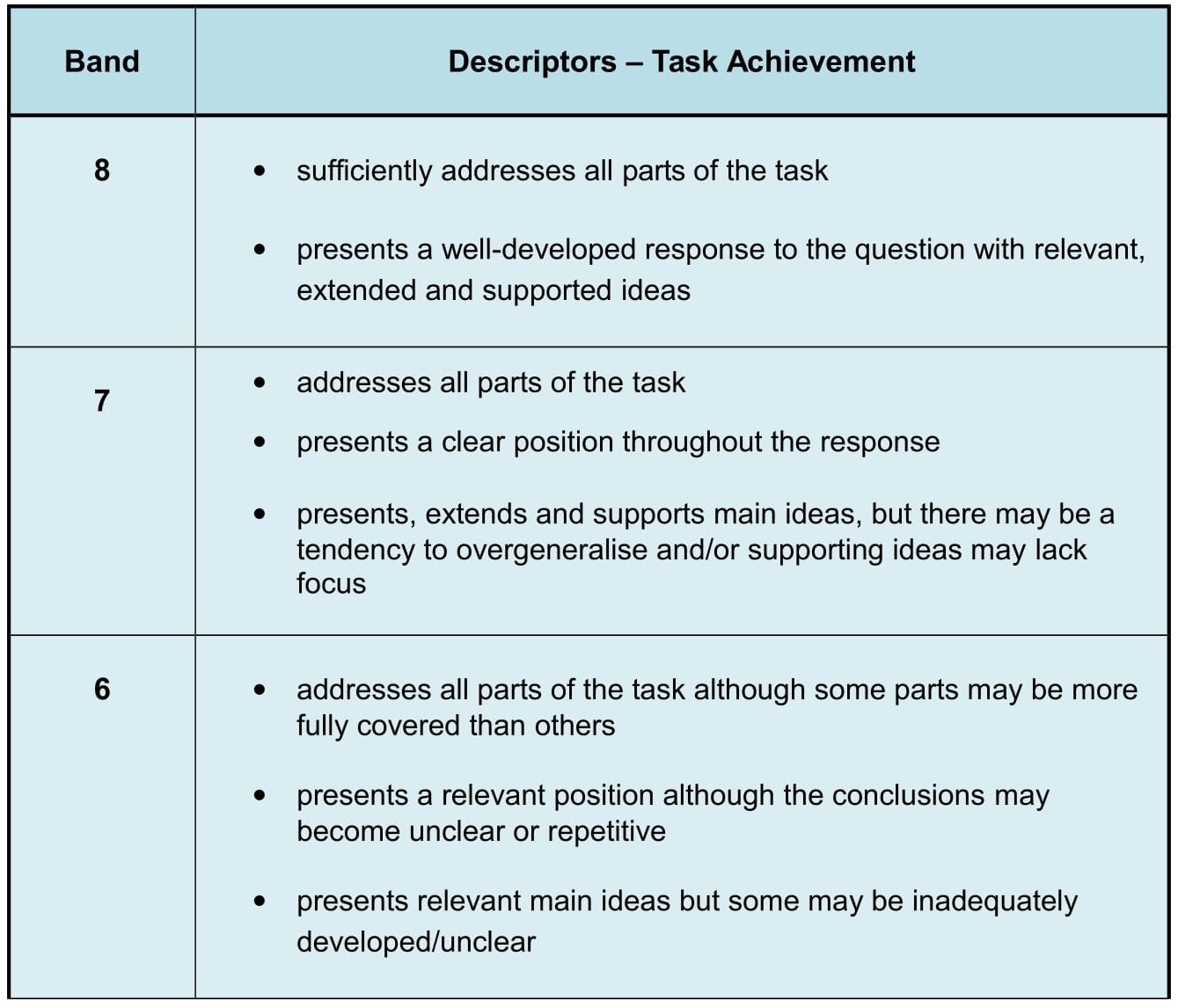
The easiest way to understand these criteria is through some examples. I go into far more detail on all the IELTS Writing Exam marking criteria on the pages on the individual question types, so don’t worry if they don’t make full sense here. See this as an overview.
Sample question:
Some people think that newspapers are the best way
to learn news. However, others believe that they can learn news better through
other media.
Discuss both views and give
your opinion.
We’ll now consider this question in relation to the 3 key marking criteria I outlined above.
1) You are required to write about the two opposing views on the best way to learn news. Do not write about news in general.
2) You must answer all parts of the question, that is, you must write about both views and also give your own opinion. If you don’t fully cover all these elements, your mark could drop to as low as a Band 5.
3) Your own opinion on the best way to learn news must be clearly stated in your essay and supported with relevant ideas and/or explanations. Include specific examples if you can.
Next, here are samples from a good and a poor answer to a question asking for solutions to the problem of criminals reoffending.
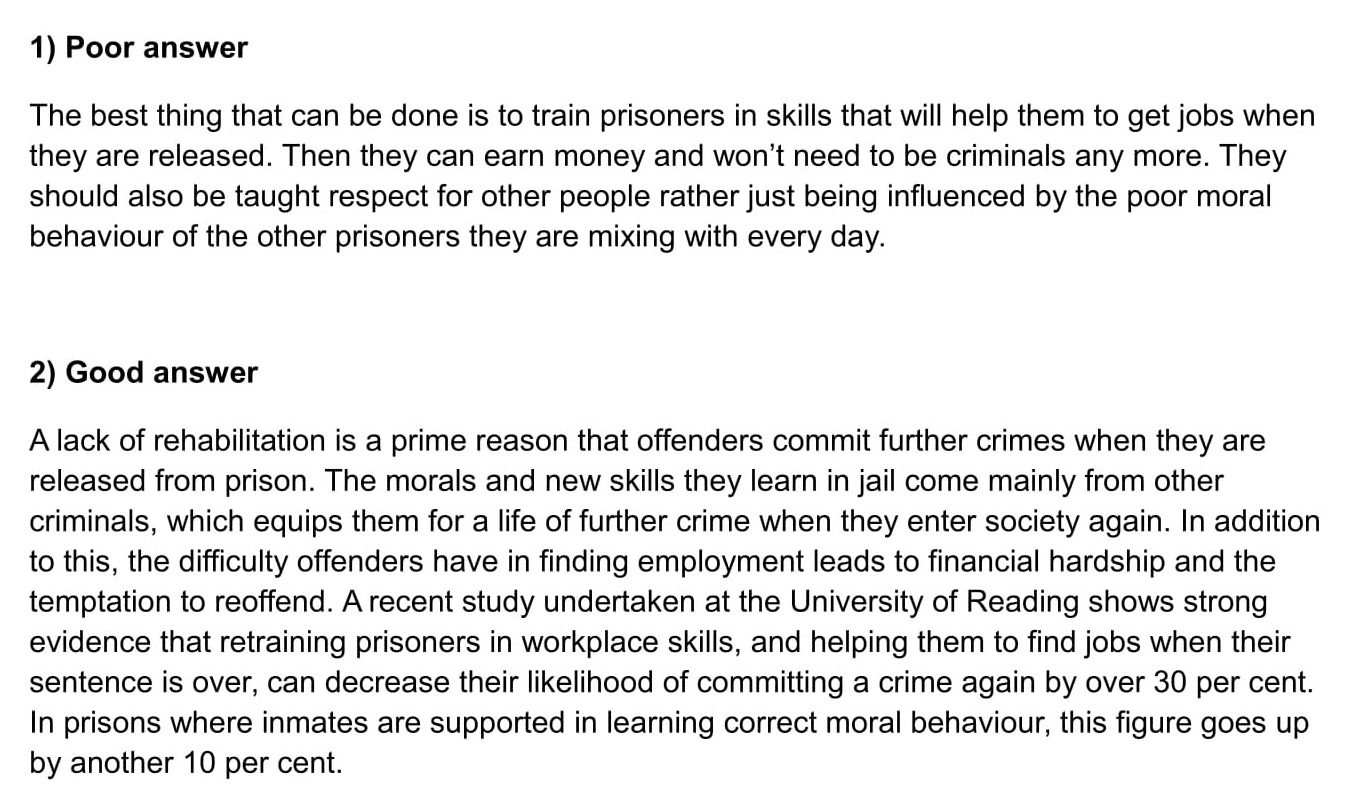
Both answers have two clear ideas but in the first answer, they are not well-developed. The second answer has more detailed explanations and also includes a relevant example to back up the ideas.
It’s fine to make up an example if you can’t think of a real one, although it must, of course, be plausible. This one is completely fictitious.
Remember that the IELTS writing exam assesses your ability to understand and use language effectively, not your factual knowledge. There are many subjects, such as this one, that you are unlikely to know much about. The examiners know this and they are not going to check up to see if the facts stated in your example are genuine or made up.
So, to summarise task achievement, check that you have:
- Answered the question being asked.
- Answered all parts of the question.
- Stated your opinion and support it
with well-developed ideas and, ideally, an example.
Cohesion and Coherence
Cohesion and Coherence are your ability to organise and present your ideas so that your essay is easy to read and understand.
To score well for Cohesion and Coherence, you must do 4 things:
- Write an essay with clear ideas that are easy to understand.
- Organise ideas and information logically.
- Progress clearly from one idea to another.
- Use cohesive devices to link ideas,
sentences and paragraphs.
Here are the marking criteria for Cohesion and Coherence, of which the above bullet points are a summary.
IELTS Writing Exam Cohesion & Coherence Marking Criteria
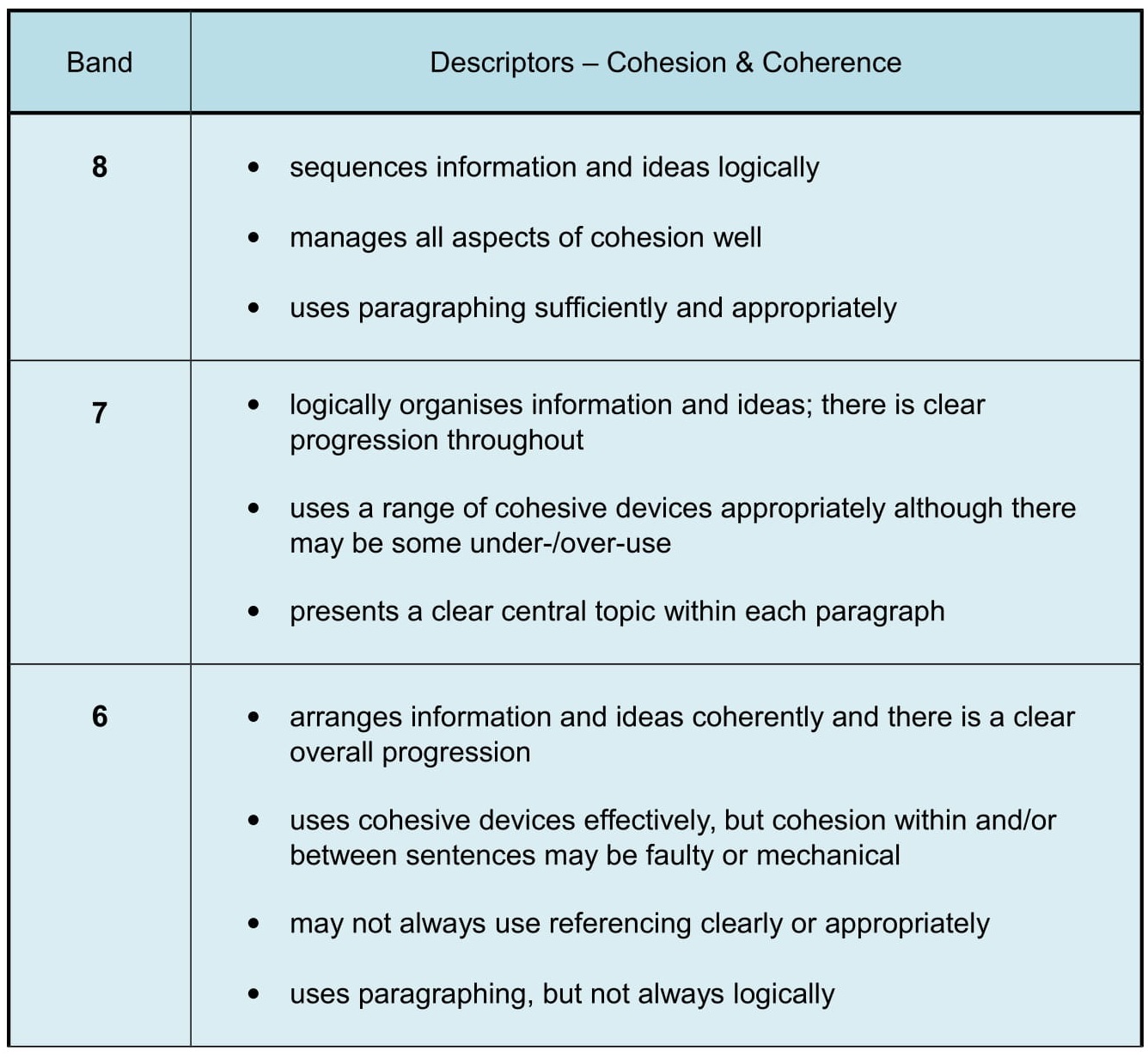
It can be helpful to look at the two parts of this marking criteria individually to give a better understanding of their significance.
Coherence refers to how well the examiner can understand what you write.
Several things can affect this, such as,
- Grammar mistakes
- Use of inappropriate words and phrases
- Illogical ordering of sentences and ideas
If the examiner can’t easily read your essay and follow your ideas, you will get a low mark for coherence.
We’ll come on to vocabulary and grammar when we consider the marking criteria specifically related to them. Here, we’ll focus on the third bullet point – how you order your sentences and ideas.
Poor paragraph structure, with ideas set out seemingly randomly, is a common and serious mistake made by many students.
Read these two examples and see if you can identify why one is poor and the other good.
Sample question:
It is better for students to work before their university study.
Do you agree or disagree?
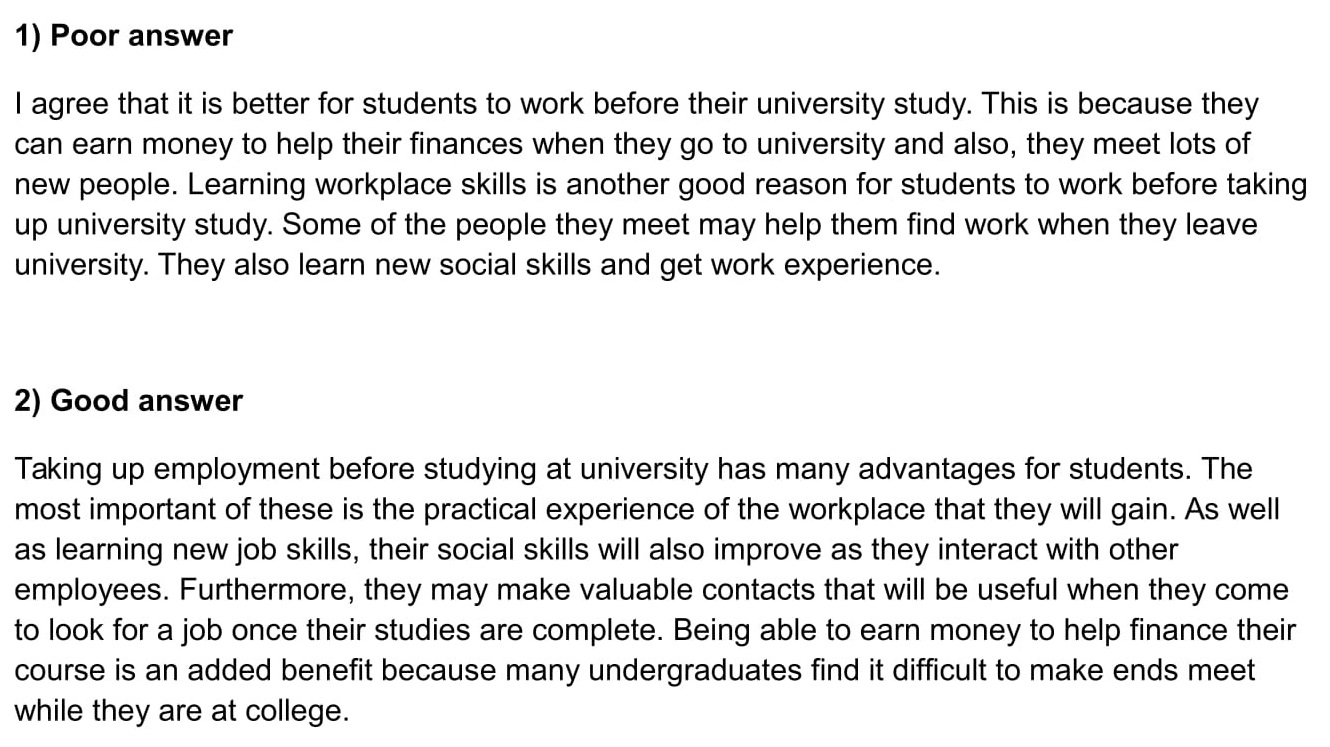
Both answers contain the same ideas but in the second answer, these flow far better from one to the other than in the first answer where the ideas are set out randomly.
A major problem with answer 1 is the repetition of vocabulary, especially vocabulary used in the question. The first sentence repeats the question word for word whilst in answer 2, the question is paraphrased, as it should be. Using appropriate synonyms wherever possible will earn you good marks.
Cohesion refers to your ability to link ideas, sentences and paragraphs using cohesive devices.
These are linking words and phrases such as:
- also
- furthermore
- for example
- such as
- as well as
- because
- although
- however
- especially
- therefore
- in contrast
- similarly
In our poor sample answer, there is practically no use of cohesive devices but they are used well in the good answer.
Here they are, highlighted.

A mistake that many students make in their IELTS writing exam is to overuse cohesive devices, thinking that using them in every sentence will gain them marks. This is wrong. It leads to them being used inappropriately which results in a loss of coherence. This is as serious a problem as underusing them.
Vocabulary / Lexical Resource
Lexical Resource means vocabulary so refers to the words and phrases you use in your essay.
To score well for Lexical Resource you must:
- Use a wide range of vocabulary.
- Use it correctly and appropriately.
- Use topic specific vocabulary.
Here are the marking criteria for Lexical Resource.
IELTS Writing Exam Lexical Resource Marking Criteria
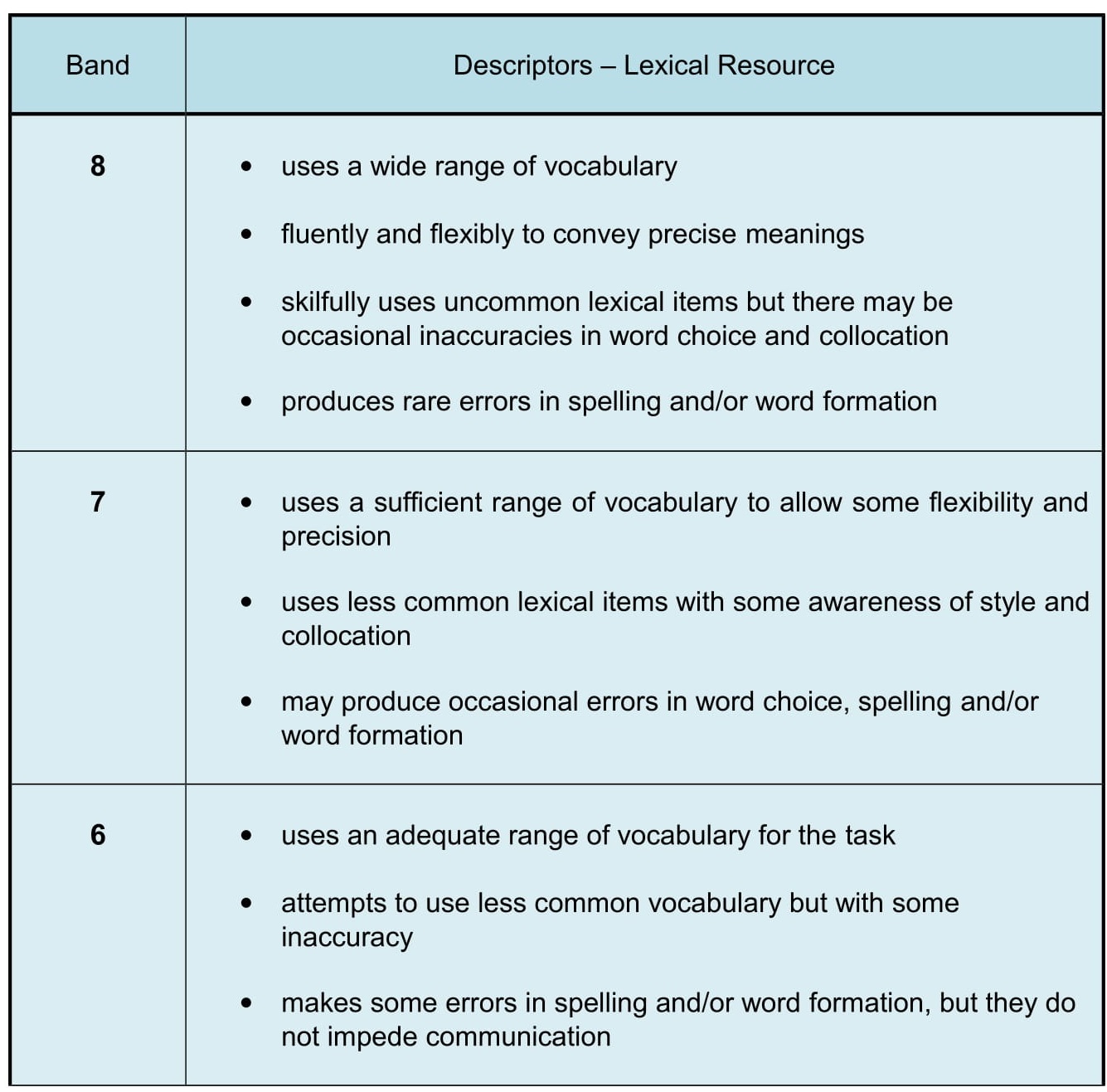
We touched a little on vocabulary when looking at Cohesion and Coherence and I’m going to use the same sample answers to illustrate good and bad use of Lexical Resource.
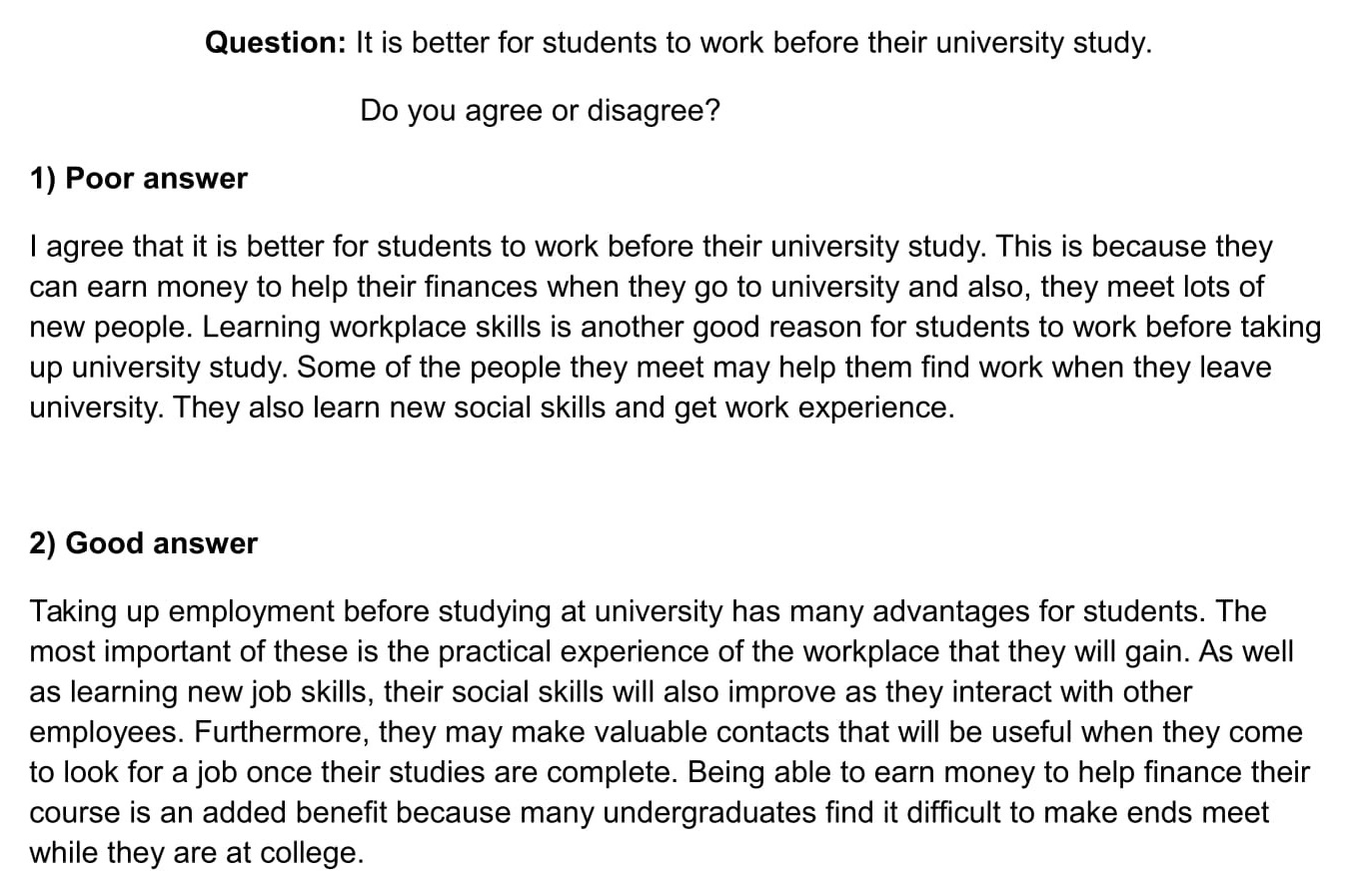
Answer 1 uses a very limited range of vocabulary with the same words, such as ‘work’ and ‘university’ being used frequently. This shows a lack of knowledge of topic vocabulary.
Answer 2 makes good use of synonyms for topic related words. For example,
- work – employment, job
- university – college
- students – undergraduates
- studies – course
As already mentioned, the question statement must be paraphrased in your essay, as in answer 2. Answer 1 repeats it using the same words and sentence structure. This will be given a low mark.
The use of a wide range of vocabulary in answer 2 also leads to better developed ideas.
Many students make the mistake of thinking that you need to use long, complicated words to score well in the IELTS writing exam. This is not the case. You just need to use the right words correctly. You must also be able to spell them correctly.
If you read answer 2 again, you’ll notice that it doesn’t contain any advanced, complex vocabulary. Rather, it uses appropriate, everyday words and phrases to express the writer’s opinion.
The correct use of collocations is also important. These are words combinations that sound right together. In answer 2, the collocation ‘valuable contacts’ has been used. However, the collocation doesn’t work with most synonyms of the word ‘valuable’, for example,
Correct
- valuable contacts
Incorrect
- expensive contacts
- costly contacts
When learning a new word, be sure to learn its common collocations too.
For more help with Vocabulary for IELTS, including what to learn and how to learn it, follow the link.
So, to summarise Lexical Resource, make sure that you:
- Use a wide range of vocabulary
- Use it appropriately
- Use synonyms to vary your vocabulary
- Use topic related words
- Know correct collocations
- Check your spelling
Grammar
Grammar refers to your ability to use a range of grammatical structures and to use them accurately.
To score well for Grammar you must:
- Use complex sentences
- Produce error-free sentences
- Use a good variety of appropriate
sentence structures
Here are the marking criteria for Grammar.
IELTS Writing Exam Grammar Marking Criteria
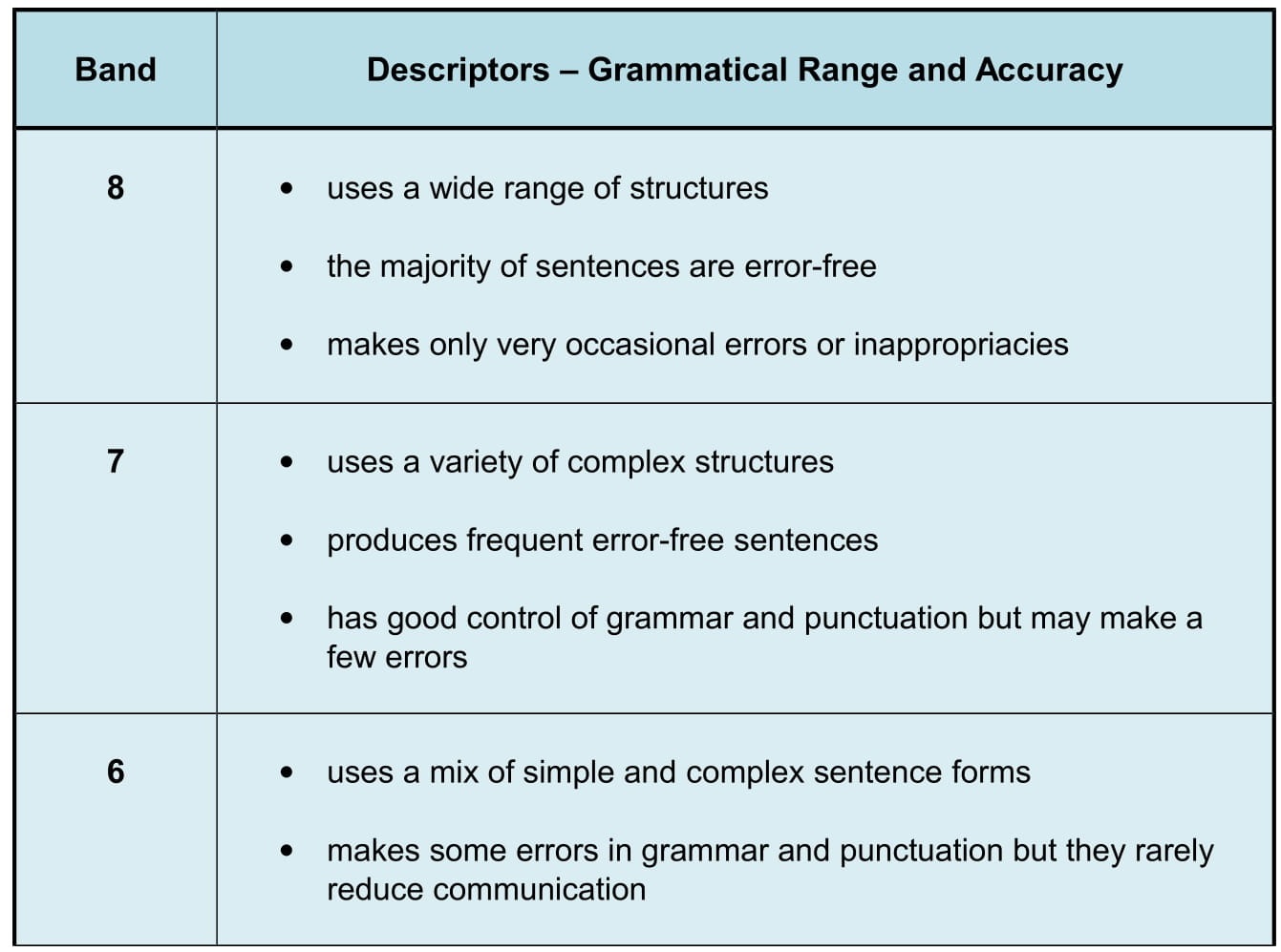
The key to scoring well for grammar in your IELTS writing exam is in your ability to produce complex sentences.
‘Complex’ does not mean ‘complicated’, as many students mistakenly think, and it has nothing to do with the verb tenses used. A complex sentence is just a sentence that contains more than one clause, often multiple clauses. It includes more than one piece of information. For example,
Hugo is studying for his IELTS writing exam and hopes to get a Band 7 so that he can apply for a place at the University of Oxford.
This sentence contains three clauses, each giving a different piece of information:
Hugo is studying for his IELTS writing exam and hopes to get a Band 7 so that he can apply for a place at the University of Oxford.
Notice the simple cohesive devices linking the three clauses – and, so that.
The number of grammatical errors you make is also a major factor in determining your mark.
- To get a Band 7, around 50% of your sentences must be free of errors.
- To get a Band 8, most of your sentences must be completely error-free.
Choosing fairly simple grammar that you can use confidently and competently will help you to achieve this.
Grammar is covered in more detail on many pages of the website so I won’t say more about it here, apart from giving you a summary of what to do and what not to do.
What you should do:
- Use simple, appropriate grammar structures correctly.
- Use a variety of complex and simple sentences.
- Ensure that your sentences sound natural.
- Check your essay for grammatical errors.
What you should NOT do:
- Try to use as many different structures and tenses as possible.
- Attempt to impress the examiner with advanced grammar.
- Make basic or systematic errors.
Like this page?
More Help With the IELTS Writing Exam
IELTS Writing Test – Understand the format & marking criteria, know what skills are assessed & learn the difference between the Academic & General writing tests.
IELTS
Writing Tips – Top 10 tips to bring you success in your writing test.
Essential information you need to know to achieve a high score.
Task 2:
IELTS Writing Task 2 – The format, the 5 question types, the 5 step essay writing strategy & sample questions. All the key information you need to know.
The 5 Types of Task 2 Essay – How to recognise the 5 different types of Task 2 essays. 15 sample questions to study and a simple planning structure for each essay type.
Understanding Task 2 Questions – How to quickly and easily analyse and understand IELTS Writing Task 2 questions.
How To Plan a Task 2 Essay – Discover why essay planning is essential & learn a simple 4 step strategy, the 4 part essay structure & 4 methods of generating ideas.
How To Write a Task 2 Introduction – Find out why a good introduction is essential. Learn how to write one using a simple 3 part strategy & discover 4 common mistakes to avoid.
How To Write Task 2 Main Body Paragraphs – Learn the simple 3 part structure for writing great main body paragraphs and also, 3 common mistakes to avoid.
How To Write Task 2 Conclusions – Learn the easy way to write the perfect conclusion for a Task 2 essay. Also discover 4 common mistakes to avoid.
The 5 Task 2 Essay Types:
Step-by-step instructions on how to plan & write high-level essays. Model answers & common mistakes to avoid.
Advantages & Disadvantages Essays



